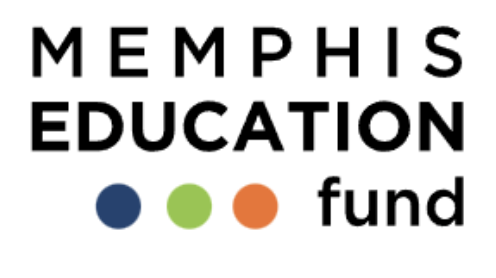2024 Memphis Ed Report
![]()
2021 Impact Statement
![]()
Fueling Teachers, Schools, and Communities
In the last five years, Memphis Education Fund has laid the foundation to re-imagine the delivery of 21st century instruction, to accelerate student achievement and to cultivate one of the most impressive local advocacy coalitions in the country. We didn’t sit on the sidelines; we rolled up our sleeves and demonstrated the Memphis “grit and grind” representative of our beautiful community.
But there’s still much more work to do…
Below, you will find a brief introduction to our 2021 Impact Report from Memphis Education Fund CEO Terence Patterson. We encourage you to spend a few moments browsing the report to review the work accomplished and work still to come, including our key priorities and goals for 2030.
2023 Legislative Priorities
Tennessee Public Charter School Commission – T.C.A 49-13-105
MEF applauds the General Assembly on its approval of the Tennessee Public Charter School Commission. We request that the General Assembly strengthen the authority of the Charter Commission to authorize high-quality schools.
Teacher Recruitment & Retention
At the beginning of the school year, Tennessee reported a shortage of 2,000 teachers. Although this year’s $125 million allocation for educator pay raises. However, Tennessee must do more to attract new educators to the profession. MEF urges the General Assembly to strengthen the recruitment and retention of teachers by enacting legislation supporting pay raises, establishing a licensure reimbursement fund, and supporting “Grow Your Own” preparation programs.
Third Grade Retention – T.C.A. 49-6-3115
Based on 21-22 achievement data, only 38% of Tennessee elementary students exceeded or met state ELA proficiency requirements. While MEF applauds the General Assembly’s efforts to boost 3rd grade literacy, the current policy should focus on providing robust academic support to students instead of using a singular metric for academic promotion. MEF urges the General Assembly to amend 49-6-3115 to allow school districts to make retention decisions for all students based upon the totality of data, discussion among stakeholders, and the expertise of educational professionals regarding the best interests of each student.
Direct Certification
Currently, the direct certification process misses some students who qualify as Economically Disadvantaged. MEF requests the General Assembly to expand direct certification to include TennCare to fully capture students from low-income backgrounds.
TISA Enhancements – 49-1-302(4)(b)
MEF applauds the General Assembly’s passage of the Tennessee Investment in Student Achievement Act. We believe by investing more dollars into education, Tennessee is poised to enjoy greater economic success. MEF requests that as TISA is implemented, the General Assembly make amendments to the legislation as needed to ensure a successful transition from the BEP formula.
Future Legislative Policy Item – 21st Century Calendar – T.C.A. 49-6-3004
MEF supports the inclusion of state funding support for districts with extended calendars (including but not limited to, additional, mandatory instructional days and/or hours) reducing the need for districts to seek additional outside funding.
2022 Legislative Priorities
Education Funding Formula – T.C.A. 49-3-307
Memphis Education Fund (MEF) supports the current effort to develop a new education funding formula. Tennessee stands at a unique opportunity to create a student-centered funding model that will account for the unique and varied needs of its students. The new formula should include support for resources like school nurses, counselors, and social workers as well as specialized needs for English Language Learners, students with disabilities and social-emotional learning.
MEF supports a substantial increase to state dollars allocated for public education – an increase to $17,000 – $18,000 would place Tennessee at the “A” level according to the Education Law Center.1
State Charter School Commission – T.C.A 49-13-105
MEF applauds the General Assembly on its approval of the State Charter School Commission. We request that the General Assembly strengthen the authority of the Commission to authorize high quality schools.
Achievement School District Transition – T.C.A 49-1-614(k)
MEF supports the return of ASD schools back to local education agencies or high-quality charter operators authorized by the Charter School Commission. To optimize success, we fully endorse transitions with full funding and low-cost school facilities.
As the Department of Education seeks to reorganize the ASD, MEF asks that the General Assembly enact supporting legislation as needed to ensure that local education agencies and charter management operators can create transition plans that are designed to address the specific needs of students and the community.
Charter School Facilities – T.C.A. 49-13-136
MEF urges the General Assembly to enact legislation that clarifies charter school operators’ right to purchase low-cost facilities from local education agencies.
MEF supports inclusion of a “facility” component in the new education funding formula that reflects facilities cost.
Teacher Recruitment & Retention – T.C.A 46-3-306
According to the National Education Association, Tennessee ranks 7th out of 12 of the Southeastern states in average instructional salary and ranks 41st nationally.2 MEF urges the General Assembly to strengthen the recruitment and retention of teachers by enacting legislation that increases teacher salaries to levels competitive to neighboring states.
Future Legislative Policy Item – 21st Century Calendar – T.C.A. 49-6-3004
State funding support for districts with extended calendars reducing the need for districts to seek additional outside funding.
1 https://edlawcenter.org/research/making-the-grade-2021.html
2 https://www.nea.org/sites/default/files/2021-04/2021%20Rankings_and_Estimates_Report.pdf

